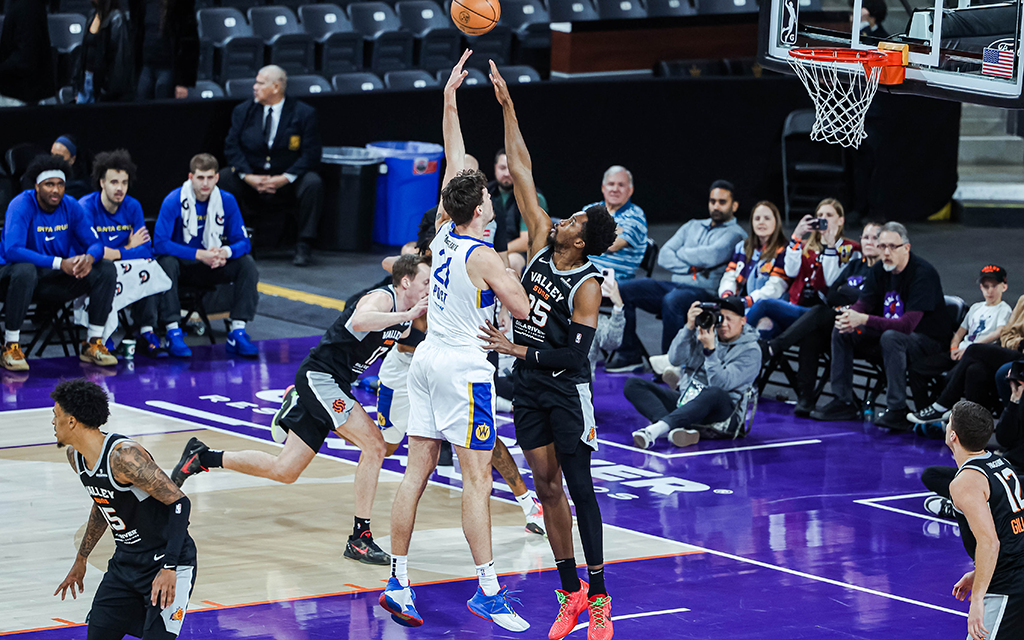PHOENIX – It’s a shot Virginia basketball fans will remember for a lifetime.
With a Final Four appearance on the line and Virginia trailing by two points with 0.4 seconds on the clock, the ball left Mamadi Diakite’s hands on a catch-and-shoot from outside the paint.against No. 3 Purdue.
The improbable shot was good, sending the Elite Eight matchup to overtime and the Cavaliers went on to win the first national championship in program history.
To play on the NCAA Men’s Tournament stage, let alone connect on an iconic buzzer-beater during a championship run, is something a young Diakite would never have imagined.
As a kid, his dream was to drive shots into a soccer net, not drop them through a basket’s net.
His father put an end to that dream, directing him toward basketball after a growth spurt. Now a member of the Valley Suns, who fell Thursday in the G League playoffs, Diakite still remembers not just what was said – but how it felt to hear his father’s words.
“I was mad,” Diakite said. “I started crying. I was like, ‘He wants to ruin my future.’”
Diakite grew up in Guinea, Africa, a culture he calls different from the U.S. The country is rich, he explained, but the people are poor. It’s a dynamic that leads many kids to aspire to a better life – and soccer is the route many choose. It’s why almost every kid there dreamed of playing the sport professionally.
Diakite was no different.
Diakite’s mind’s eye could imagine him moving to France and starting on the Paris Saint-Germain Academy team. Diakite showed potential in soccer, and his goal seemed attainable.
Then he experienced that growth spurt, and his father pushed him to play basketball. The NBA had never crossed his mind, but soon the sport engulfed him.
At an early age, people laughed at the idea of him switching sports, but his competitive drive easily transferred from the pitch to the court, and it fueled him to prove doubters wrong.
“So that pushed me to say, ‘Hey, I’m going to make it to the NBA,” Diakite said. “Nobody believed it, and no one believed in me, until I made my way up here.”
The challenging transition was made easier thanks to a strong bond Diakite shared with his brother. But that connection and his motivation were tested during a one-on-one game, when Diakite got crossed up and fell.
“It was kind of on concrete, so I slid,” Diakite said. “He then made fun of me and pointed at me, and then later, I said, ‘This game is too weird. I’ll never play this game again.’ That’s what inspired me, besides what my dad did about (playing) basketball.”
The footwork in soccer came naturally to Diakite, but learning to dribble and shoot took repetition. He played basketball like a soccer player, throwing the ball above his head with two hands.
“They (family) were telling me to (dribble)t without looking down every time,” Diakite said. “I had to put in the hours and get used to it (dribbling). Shooting was crazy, too. People would make fun of me, those who played basketball. I had to put a lot of work in.”
Soccer has helped a lot of basketball players in the past take a step in their basketball career. Golden State Warriors coach Steve Kerr once talked about the importance of playing soccer on the NBC Sports “Men in Blazers” podcast.
“If I was the czar of American basketball I would make every player coming through the youth basketball program play (soccer),” Kerr said.
There is a long history of former youth soccer players transitioning to basketball success. Two-time NBA MVP Steve Nash played youth soccer in Canada and his father and a younger brother both played professionally.
Mavericks coach Jason Kidd and Houston great Hakeem Olajuwon also starred on the pitch before the court. Pistons guard Dennis Schroder played for a German pro soccer team just last summer.
The game of soccer helps teach young athletes how to play as a team, something Kerr thinks the younger generation of basketball players lack.
Diakite’s improvement led him to the U.S., where the culture shock was immediate when he visited New York’s Times Square and then went on to Blue Ridge High School, a boarding school in Virginia.
It wasn’t easy. His NBA dreams alone couldn’t distract from the realities of living 6,535 miles away from his home and family. Diakite spoke mostly his native language and French. Learning English was another challenge.
“Anything they had to explain, I couldn’t understand,” he said. “They’d have to draw it for me to understand because it was a language barrier. But I was smart enough.”
Despite limited experience playing basketball, Diakite’s natural athletic ability carried him in high school.. He drew interest from college programs, including USC and Washington. While continuing to acclimate to U.S. culture, thoughts of family began to creep into his mind, but it only served as fuel.
“I wanted to make it for my family,” Diakite said.
Cavaliers coach Tony Bennett offered the unfinished project a scholarship to attend Virginia. Despite the small sample size of his playing career, the coaching staff saw potential.
“He was very athletic,” Virginia associate coach Jason Wiliford said. “He had some ball skills; he could shoot it, put it on the floor, catch it, and dribble. It was intriguing.
“To us, he had some hurdles that he had to overcome, such as the language barrier and some academic stuff, but he’s a bright kid.”
His lively attitude quickly encapsulated the coaching staff. His work ethic shined, and he did it all with a smile.
“He’s a jovial kid, always smiling,” Wiliford said. “Worked hard. There were some good players in front of him when he got here, and he had to wait his turn, but hard work wasn’t anything he was afraid of. …He just put countless hours in the weight room on the court, but he always did it with a smile.
“He had to do some growing up earlier on. Being punctual was not something he was used to. So he made his teammates run quite often for being late to live and being late to work out, so they got a hold of him early.”
The coaching staff took a swing, and now has its only national title to show for it. But the hardware kept coming for Diakite.
He went undrafted and spent his rookie season with the Milwaukee Bucks, where he won an NBA championship in 2021.
But while Diakite found team success again at the next level, his career would face many challenges. Struggling to settle with a team, he had stints with the Bucks, Thunder, Cavaliers, Knicks, Spurs and Suns, all in five years. Most of those contracts were two-way, where the majority of his time was spent in the G-League.
“It takes a lot of mental toughness and just grit, drive to pursue and chase that childhood dream,” Wiliford said. “He’s going to continue to work towards that. He is confident in his ability, and he just wants somebody to give him a shot and hope to stick and get that big contract. Sometimes I wonder if it would be wise (for him) to just go back abroad and make a ton of money overseas.
“That’s not his goal. His goal is to play in the league, and he’s going to chase that as long as he has to.”
What started as a desire to make the NBA has turned into a drive to earn a lucrative deal. Still, without the big contract, his family back home has made him realize how accomplished his journey has been.
“It hasn’t hit me yet, but often it will,” Diakite said. “I try not to focus on that even though the accolades are great. I try to focus on what I can do to take the next step and go for the bigger picture.”
His joyful mindset has carried on throughout his life, but Diakite knows that he wouldn’t have gotten to this point in his career if weren’t serious when he steps between the lines.
He’s developed into a quality basketball player, and when he reminisced about the shot he hit for Virginia, he said, “Forget the shot.”
The reason he’s here is through his hard work.
He averaged 12.7 points and 8.3 rebounds this past season with the Valley Suns while starting 25 for the team this year. In his first season in the G League he only started three games, but averaged 18.5 points and 10.3 rebounds. The stats may not be better, but he’s grown as a player in that time.
A comparison he used is Bucks star Giannis Antetokounmpo. Diakite mentioned that he’s a star now because he was allowed to develop in his way, with his attitude and smile. Everyone in the NBA knows Antetokounmpo smiles and has a good time, but when the game starts, the killer instinct activates.
Diakite says he shares something with the NBA superstar, and he takes pride in being a kid from overseas.
“We play with heart,” Diakite said. “We play with emotions. It drives us to play hard and to not give up. It doesn’t matter who we play against. … We have this belief back home back home that you die for your country.”


